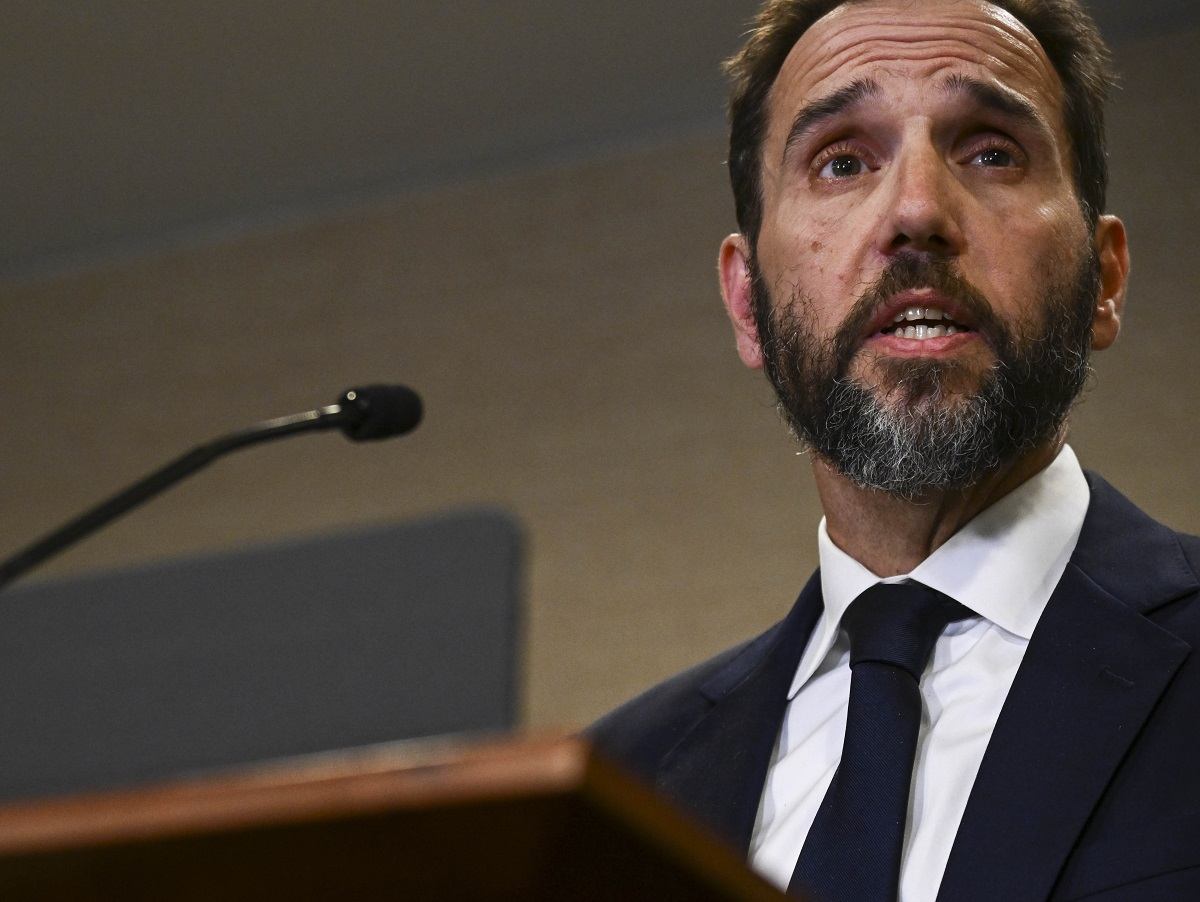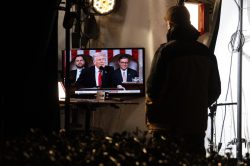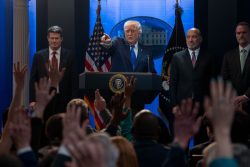
Special counsel Jack Smith announces D.C. indictment of former president Donald Trump during a news conference on Aug. 1, in Washington.
15:32 JST, December 12, 2023
The Supreme Court said Monday it will consider special counsel Jack Smith’s request to fast-track consideration of Donald Trump’s claim he is immune from prosecution for alleged election obstruction in 2020 – intensifying the legal jockeying over whether Trump’s criminal trial in D.C. will stay on schedule for early next year.
The decision by the nation’s highest court doesn’t mean that the justices will definitely short-circuit the typical appeals process, but it means they are going to hear arguments from both sides about whether they should act quickly. Trump’s lawyers were told to file briefs on the issue by Dec. 20.
The quick response by the Supreme Court came hours after Smith’s office filed its request seeking to essentially leapfrog an appeals court process that Trump has already started but which could take months to resolve. A lengthy appeal could slow the Justice Department’s push for a March trial for Trump, the front-runner for the 2024 GOP presidential nomination.
It is unusual for the government to ask the court to disrupt the judicial process, and to do so quickly. “The United States recognizes that this is an extraordinary request,” Smith wrote. “This is an extraordinary case.”
He added that without special intervention, the Supreme Court might not be able to consider the issue before the justices complete their term in June.
The timing of Trump’s four criminal cases is of paramount concern to both prosecutors and the former president’s legal team. Smith has also charged Trump in Florida with allegedly mishandling classified documents and obstructing government efforts to retrieve them; in addition, Trump faces state charges in New York for alleged hush money paid during the 2016 election, and in Georgia alleging a massive conspiracy to undo the 2020 election results in that state.
In the face of the four indictments, Trump has denied guilt and tried to push his trials beyond Election Day in November. Smith’s latest legal gambit aims to keep the Washington trial on its current schedule. That schedule calls for Trump’s D.C. trial to begin one day before the Super Tuesday primary – underscoring how messy next year’s political and legal calendars could be.
“It is of imperative public importance that respondent’s claims of immunity be resolved by this Court and that respondent’s trial proceed as promptly as possible if his claim of immunity is rejected,” the filing from Smith argues.
The Trump campaign in a statement accused Smith of trying to interfere with the 2024 election, saying he “is willing to try for a Hail Mary by racing to the Supreme Court and attempting to bypass the appellate process. … There is absolutely no reason to rush this sham to trial except to injure President Trump and tens of millions of his supporters.”
Trump’s legal team had earlier asked U.S. District Judge Tanya S. Chutkan to dismiss the charges against him, arguing that presidential immunity protects him from prosecution over his conduct during his waning days in office. Chutkan, who is overseeing the case, ruled against Trump, who plans to appeal that ruling.
That appeal, however, could take months and significantly delay the start of the trial. So Smith – the federal prosecutor appointed by Attorney General Merrick Garland to lead the investigation of Trump – is seeking to speed up the process by taking the highly unusual step of going directly to the Supreme Court after his office prevailed in District Court.
Smith argued in the filing that Trump’s legal claims of immunity “are profoundly mistaken, as the district court held. But only this Court can definitively resolve them.”
He noted that in recent years the court has granted requests to consider cases of “imperative public importance” before an appeals court had completed its review. Among them were challenges to President Biden’s attempt to forgive student loan debts; review of a Mississippi abortion law that led to overturning Roe v. Wade, and the proposed addition of a citizenship question to the census.
In arguing that the justices should take up the issue of Trump’s immunity right away, Smith cited the Supreme Court’s landmark United States v. Nixon decision, which ordered President Richard M. Nixon to deliver White House tapes and other documents to a federal district court. The unanimous ruling said a president does not have absolute immunity from subpoenas or other court actions.
The Supreme Court expedited consideration of the Nixon case, and delivered its opinion three weeks after oral argument.
Derek Muller, a University of Notre Dame law school professor, described Monday’s filing as rare and said Smith was asking the Supreme Court for “extraordinary relief.”
He said the Supreme Court is often reluctant to get involved when it doesn’t need to, but that there is no harm in Smith making the request as he explores every legal avenue to ensure the case proceeds on schedule.
“March 4th sounds like it is a long ways away – but it’s not. Especially when you have multiple layers of judicial review and pending appeals,” Muller said. “Smith’s team is trying to wrap up things as quickly as possible to eliminate uncertainty.”
Trump picked one-third of the sitting Supreme Court justices during his four years in office. But the former president does not have a winning track record at the high court. The justices turned aside requests from Trump and his supporters to get involved in challenges to the 2020 election results. It ruled against his claims that the presidency protected him from investigation and rejected his efforts to block release of his financial records.
Last year, the court refused Trump’s request to block the release of some of his White House records to the House committee investigating the Jan. 6, 2021, attack on the U.S. Capitol by a pro-Trump mob that was trying to heed his calls to overturn Joe Biden’s election victory. The justices also denied Trump’s effort to block a congressional committee from examining his tax returns after an extended legal battle.
In his petition to the court, Smith acknowledged the question of criminal liability for a president is one the justices have not confronted.
But “a cornerstone of our constitutional order is that no person is above the law,” Smith wrote. “The force of that principle is at its zenith where, as here, a grand jury has accused a former President of committing federal crimes to subvert the peaceful transfer of power to his lawfully elected successor.”
The government’s brief was signed by Smith and members of his special counsel team that now includes attorney Michael R. Dreeben, a former deputy solicitor general who has argued more than 100 cases at the Supreme Court. Dreeben also worked on the special counsel team of Robert S. Mueller III, which investigated Trump when he was president.
Smith told the justices that at the same time he was asking them to step in, he was requesting that the U.S. Court of Appeals for the D.C. Circuit expedite its review of Chutkan’s ruling. If the Supreme Court chooses not to bypass the appeals court, Smith said, “it may wish to note that the court of appeals should proceed with sufficient dispatch to permit the Court to hear this case promptly during its currently scheduled argument sessions for this Term.”
The Supreme Court’s last day of scheduled oral arguments is April 24.
The appeals court also responded to Smith on Monday, giving Trump until Wednesday to weigh in on the special counsel’s request to fast-track the proceedings in that court. The three judges assigned to the case include two Biden appointees, Michelle Childs and Florence Pan, and one George H.W. Bush appointee, Karen Henderson.
It is rare, but not unheard of, that the Supreme Court intervenes in a case before an appeals court decides the issue. Generally, the justices feel they benefit from the briefing before lower court judges and those judges’ consideration of an issue.
Smith’s proposed briefing schedule in D.C. would give Trump 10 days to appeal Chutkan’s ruling that Trump is not immune from prosecution. Smith proposes that the government get a week to respond, and Trump three days to reply to that response.
Even if the court agrees to that schedule, the appeals court judges can take as long as they want to render a decision. When Trump claimed immunity from any lawsuit over his actions on and around Jan. 6, 2021, for example, oral argument was held in December 2022. But the decision – with the appeals court ruling against him – just came out this month.
Top Articles in News Services
-

Survey Shows False Election Info Perceived as True
-

Hong Kong Ex-Publisher Jimmy Lai’s Sentence Raises International Outcry as China Defends It
-

Japan’s Nikkei Stock Average Touches 58,000 as Yen, Jgbs Rally on Election Fallout (UPDATE 1)
-

Japan’s Nikkei Stock Average Falls as US-Iran Tensions Unsettle Investors (UPDATE 1)
-

Trump Names Former Federal Reserve Governor Warsh as the Next Fed Chair, Replacing Powell
JN ACCESS RANKING
-

Producer Behind Pop Group XG Arrested for Cocaine Possession
-

Japan PM Takaichi’s Cabinet Resigns en Masse
-

Man Infected with Measles Reportedly Dined at Restaurant in Tokyo Station
-

Israeli Ambassador to Japan Speaks about Japan’s Role in the Reconstruction of Gaza
-

Videos Plagiarized, Reposted with False Subtitles Claiming ‘Ryukyu Belongs to China’; Anti-China False Information Also Posted in Japan

























